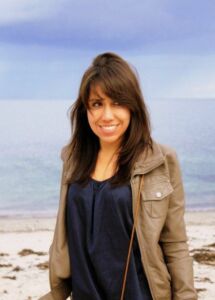Business
Proud to come to work every day
This article is more than 11 years old.
Honduran global brand manager Ivania Casco tells us about her workplace

Ivania Casco, a global brand manager at Arla (photo: Vincenzo Liso)
What’s your job title and what do you do during a typical day at work?
I’m a global brand manager at the Arla Global Cheese Category, responsible for growing the Arla brand in Sub-Saharan Africa, Southeast Asia and Latin America.
I work with global marketing in emerging markets, so my job involves a lot of travelling, from 30 to 60 days a year. My key task is to ensure we grow the Arla brand and the Cheese Category Globally.
A lot of what I do with my colleagues in the countries is to work on establishing the foundation for delivering Arla’s growth ambitions in the selected regions.
This can mean anything from packaging design, and speaking to mothers in different parts of the world and understanding their needs, and how we as a company can fulfil them, to leading and participating in projects that will result in major growth opportunities in the future.
What did you do before working at Arla?
I am from Honduras, where I trained as an industrial engineer. I then worked for a Central American company, where I developed a passion for working in the highly dynamic FMCG sector, at the time focusing on logistics and operations.
I was then so blessed to be awarded the Erasmus Mundus scholarship to study global innovation management. I started my master’s degree in Glasgow, and then I had the opportunity to go to Germany or Denmark to complete it.
I had read that Denmark was the happiest country in the world and that Aalborg was the ‘Paris of Scandinavia’, so it was an easy decision! (Although I do challenge that Aalborg is the Paris of Scandinavia, it is still a lovely city!)
Is Arla different from your previous employer?
Yes, they are very different. In Honduras I worked for a family-owned company, run by its founder, at the time 80 years old, who is a brilliant entrepreneur. Like other American companies, it was a very top-down organisation.
This meant also that he decided when and how to take risks – very much based on his business acumen and that of his close collaborators. Failure was always an option, but in general, his skills led him to massive success in his highly diversified business portfolio.
In my first company, I learned a lot of fantastic fundamentals about doing business, as well as the importance of working in multi-disciplinary teams. These lessons have been extremely valuable for my performance at Arla.
However, Arla has taught me an entirely different way of doing business. Big FMCG global companies like Arla operate radically differently.
Selling in more than 100 countries, and having an employee base of more than 19,000 people, implies that there is a lot of structure, processes and analyses in place. Even though strategy does come from the top, the Scandinavian approach enables operational levels to define the ‘how’ of the strategy.
Decisions are not solely based on business acumen, but on extensive research and analyses. We have a responsibility towards the farmers who trust that we will deliver the best possible results, for which reason decisions are always based on extensive analysis.
As a global brand, how does Arla adapt to the local conditions in particular markets?
Arla caters to an intrinsic, instinctive global need – probably one of the biggest of all – which is the need of caregivers to be able to provide the best possible nutrition to their families to enable them to succeed in life. Arla stands for ‘Nourishing Life’s Opportunities’.
We want to be able to service families, the gatekeeper of which is generally still the mother – she decides what comes into the house. We have the best raw material to do so: milk, which is a natural source of 25 micronutrients and protein. And we can convert it in hundreds of ways to suit taste profiles of consumers all over the world.
Therefore, if we meet a mum in Nigeria who wants her child to stay alert in school, we can offer her our fortified milk powder range. If we meet a Danish mum who needs a convenient product to give to her young teen who is practising soccer every day, we offer Arla Protino. The needs are different, and Arla can cater to them, in many different shapes and forms of milk.
What’s the best thing about working at Arla?
That’s easy. Arla is a company I admire tremendously. Arla’s identity is ‘Good Growth’, which means that, yes, we need to focus on profit, but we also need to focus on responsible business (towards stakeholders, consumers, society and partners), providing products that are healthy and natural, and this is done in a co-operative manner.
As we are a co-op owned by farmers, this way of working is in our DNA. It’s incredibly rewarding to see that whenever Arla decides to do business in a country it benefits the local society enormously. It provides employment for its people and raises the bar of the quality and nutrition of products sold – and rest assured, it is only a matter of time before local companies follow.
As I work with emerging markets, I am proud to come to work every day, as I know that we as a company have chosen to sign on to their manifesto of hope, progress and aspiration, and to grow responsibly – together with them.










































